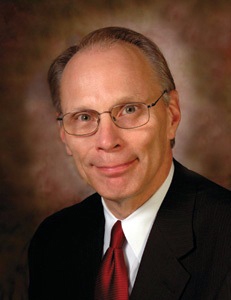Simpson College ‘Has Never Been Stronger’

September 23, 2010
As we celebrate the sesquicentennial of Simpson College it can be argued that in its 150-year history, Simpson has never been stronger. From my vantage point as the 22nd president, that strength is a reflection, not of recent accomplishments, but of the deeply committed and often sacrificial service offered by faculty, staff, students, administrators, alumni, ministers, and citizens of Indianola, Warren County, and central Iowa over the past 15 decades.
The history of Simpson overflows with stories that herald the courage and tenacity of those who built the foundation we stand on. In my reading of Simpson history, none of them are more compelling or representative than the year that Simpson was saved by all those who would not let it die.
In 1878 Thomas Berry assumed the presidency of the fledgling Simpson Centenary College. It was a time of economic turmoil as much of the world was suffering through an economic depression that began in 1873 and continued until 1879. The situation for Simpson Centenary had become so dire that newly-elected President Berry called together the senior class as the term began to offer them their credentials if they wished to transfer. He feared that Simpson might close and they would not have the opportunity to complete their studies and graduate. At the time, every part of the Simpson campus was mortgaged to the maximum and the college’s debt equaled three times the annual operating budget. As related in Joe Walt’s masterful history of Simpson College, the seniors met that evening and proclaimed in their class notes that “they were going to stick with Simpson for as long as there is a plank left to stand on.”
Had students not chosen to stay, Simpson would surely not be here today.
Financial circumstances were in fact so dire that the faculty would not be paid during that entire academic year. In the place of their regular salaries, faculty members were issued warrants that the college hoped to make good once financial circumstances improved. Before the year was over, some of those warrants would be sold at deep discounts to their face value as many creditors were concerned that the college would not be around to make those notes good.
Had the faculty not chosen to serve without pay, Simpson would surely not be here today.
President Berry was determined to do everything he could to ensure the survival of the college. He solicited and received support from the Methodist clergy in the conference. Together they pledged over $10,000 with the stipulation that an additional $15,000 be raised in the community by the close of commencement the following spring. For many clergy, their donations represented 10-25 percent of their total compensation for the year. Yet they wanted Simpson to survive and were deeply committed to making whatever sacrifices were necessary.
Had Methodist clergy not stepped up to the challenge, Simpson would surely not be here today.
With the academic year ahead, Berry, along with members of the board of trustees, went about the task of raising the $15,000. By the end of the academic year and with commencement the next day, it was clear that the fundraising committee would fall short of meeting that goal. In a poignant passage in Professor Walt’s book, “Beneath the Whispering Maples,” one trustee said it this way, “We sat up with it all night. Nearly everybody was crying, because we were going to quit it the next morning.” President Berry was committed to trying one more time to raise the final $1,200 needed to make the match, and at the end of the commencement ceremonies the next day, it was announced that unless $1,200 was raised that morning, all of those in attendance were “sitting at the bedside of a dying Simpson Centenary.”
The following from Joe Walt’s book relates what happened next.
“There was a long silence in the room, which M.R. Barker broke by saying, ‘Put my name down for $100.’ Several other men followed with pledges of $100, then people gave anywhere from $5 to $50. When all was said and done, $1,210 had been raised.”
Without the support of those in the Indianola and Warren County community, Simpson would surely not be here today.
As for Thomas Berry, sadly he died the following year at the age of 39. He left a great void at Simpson, yet his dedication and perseverance inspired others to be equally committed to the college’s future success.
In our celebration of all that Simpson is today, it is my hope that we will reflect on those who have gone before us and rededicate ourselves to this wonderful institution and to those high ideals of higher education that led a group of community leaders to act on the preposterous idea of starting a college on the edge of the frontier in a town that was itself only eleven years old. But start it they did and now, 150 years later, we celebrate the improbable and inspiring history of Simpson College.
Throughout our 150 years, Simpson has relied on those who loved it most to do whatever was necessary to ensure its survival and its ascendancy into one of the top liberal arts colleges in the land. All of us who are now entrusted with the future of Simpson College must obligate ourselves to that same level of commitment and sacrifice as we work to ensure the next 150 years of this historic institution.
To be sure, that is a sacred responsibility that we owe to all of those who have gone before us and equally to all those who will succeed us. Mirroring the commitment of those who have gone before us, surely Simpson will thrive for another 150 years.












